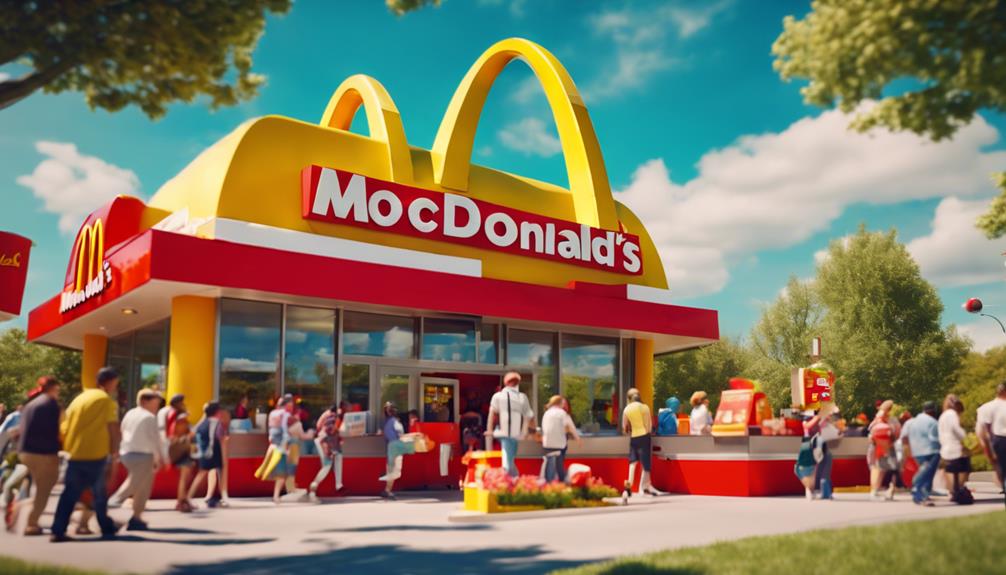McDonald's surprises many with its rich history and global influence. Founded in 1940, it now operates over 38,000 locations in 119 countries, adapting its menu to suit local tastes. The brand's iconic golden arches boast a 96% recognition rate among children. McDonald's invests considerably in employee training at Hamburger University, ensuring operational excellence and consistency. Furthermore, it actively engages in sustainability efforts, focusing on waste reduction and community support. With such fascinating facets, it's clear the fast-food giant has much more to offer than meets the eye. There's plenty more to uncover about this beloved brand.
Key Elements
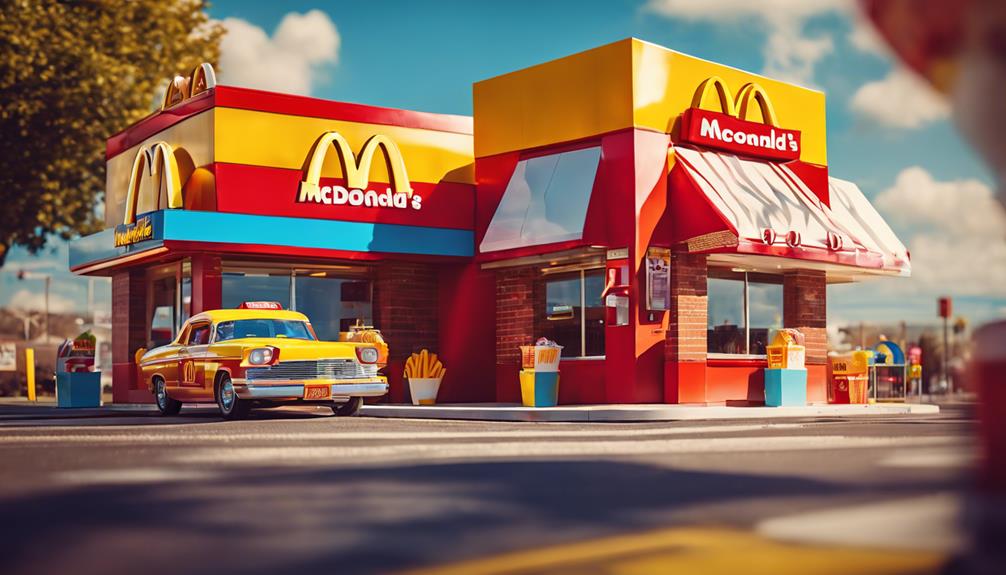
In exploring the key elements of McDonald's, one must consider the company's overview, business operations, and what franchisees need to know.
Each aspect plays an essential role in understanding the brand's global success and operational strategies.
Together, these points provide a detailed picture of how McDonald's maintains its status as a leading fast-food chain.
Company Overview
McDonald's, a global leader in the fast-food industry, operates in 119 countries and remains committed to adapting its menu and services to diverse markets. Founded in 1940, the brand has evolved considerably, offering a range of items tailored to local tastes, such as the McSpicy Paneer in India and the Giga Big Mac in Japan.
With over 38,000 locations worldwide, McDonald's emphasizes consistency in quality and service. The company also invests heavily in employee training through Hamburger University, enhancing operational excellence.
Remarkably, McDonald's has embraced technology by integrating digital ordering kiosks and mobile apps, streamlining customer experiences. Through its innovative strategies and community engagement, McDonald's continues to maintain its position as a beloved dining option globally.
Business Overview
Building on its strong global presence, the business overview highlights key elements that contribute to McDonald's success in the competitive fast-food market. With operations in 119 countries, McDonald's adapts its menu to local tastes, showcasing its flexibility.
The company emphasizes rapid service and consistency, ensuring customers receive familiar products worldwide. McDonald's innovative marketing strategies, like the iconic 'I'm Lovin' It' jingle, have solidified brand identity, while extensive employee training through Hamburger University enhances operational excellence.
Additionally, McDonald's commitment to sustainability, particularly in toy production, aligns with modern consumer values. Together, these elements create a robust framework that drives McDonald's ongoing growth and customer loyalty, solidifying its status as a leader in the fast-food industry.
Information for Franchisees
Franchisees benefit from a well-structured support system that includes thorough training, marketing resources, and operational guidelines to guarantee success in the fast-food industry.
McDonald's provides extensive training programs through Hamburger University, ensuring franchisees and their staff understand operational excellence and management skills.
They also receive marketing support, including access to promotional materials and strategies that enhance brand visibility.
Franchisees can tap into a vast supply chain network, ensuring consistent product quality and availability.
Additionally, McDonald's emphasizes ongoing support, offering franchisees advice on best practices and innovations.
This collaborative environment fosters a strong relationship between the corporation and its franchisees, ultimately contributing to sustained profitability and growth in a competitive market.
Company Overview
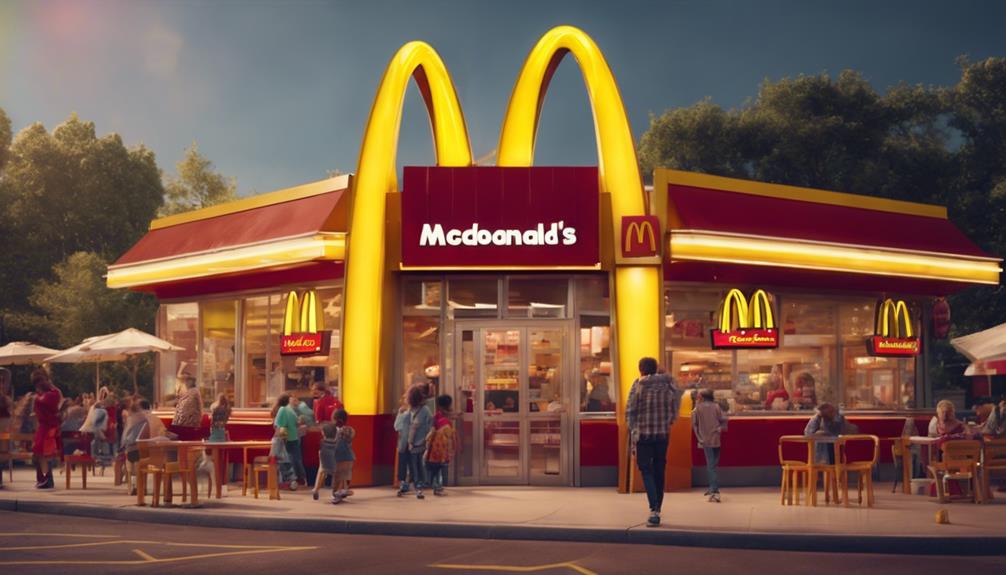
McDonald's began its journey in 1940 with the opening of its first restaurant in San Bernardino, California.
As a global fast food leader, the company has established a strong executive team and structure to support its operations.
Additionally, McDonald's actively engages in community initiatives worldwide, reflecting its commitment to social responsibility.
First Restaurant Opened in 1940
Opening its first restaurant on May 15, 1940, in San Bernardino, California, the company set the stage for a global fast-food revolution. Founded by Richard and Maurice McDonald, the original location featured a simplified menu that included hamburgers priced at just 15 cents, cheeseburgers, and french fries.
This innovative approach emphasized speed and efficiency, allowing customers to enjoy quality food quickly. The McDonald brothers' vision laid the groundwork for what would become a massive franchise model. By focusing on operational excellence and customer satisfaction, McDonald's quickly gained popularity, paving the way for its expansion.
Today, the brand stands as a symbol of fast food, with thousands of locations worldwide and a diverse menu that continues to evolve.
Global Community Engagement Initiatives
Engaging with communities worldwide, the company actively participates in various initiatives aimed at supporting local needs and enhancing social responsibility.
McDonald's collaborates with local organizations to address issues like hunger, education, and youth development. Through programs such as the Ronald McDonald House Charities, they provide housing and support to families with sick children.
The company also invests in sustainability initiatives, focusing on reducing waste and promoting recycling in communities.
Additionally, McDonald's offers scholarships and educational programs to empower young people and help them achieve their goals.
These efforts demonstrate the brand's commitment to being a responsible corporate citizen, fostering positive relationships with communities while making a meaningful impact on global social challenges.
Executive Team and Structure
The executive team at McDonald's plays an essential role in steering the company's strategic direction and operational success.
Led by the CEO, the team comprises experienced professionals from various industries, including finance, marketing, and operations. This diverse leadership fosters innovation and effective decision-making, enabling the company to navigate ever-changing market dynamics.
The team prioritizes initiatives that enhance customer experience and drive profitability while maintaining corporate responsibility. Additionally, the structure supports collaboration across departments, ensuring that each segment contributes to McDonald's overarching goals.
Global Fast Food Leader
McDonald's stands as a global fast food leader, renowned for its extensive reach and adaptability in diverse markets around the world.
Operating in 119 out of 194 countries, it showcases a remarkable international footprint, catering to local tastes while maintaining core menu items.
The brand's ability to innovate, such as introducing unique offerings like the Giga Big Mac in Japan and future doughnut partnerships, highlights its commitment to customer engagement.
McDonald's has also cultivated a strong marketing presence, aligning with major events like the Olympics.
With iconic branding and a focus on employee training through Hamburger University, McDonald's continues to set industry standards, ensuring its position at the forefront of the fast food sector globally.
Brand Identity
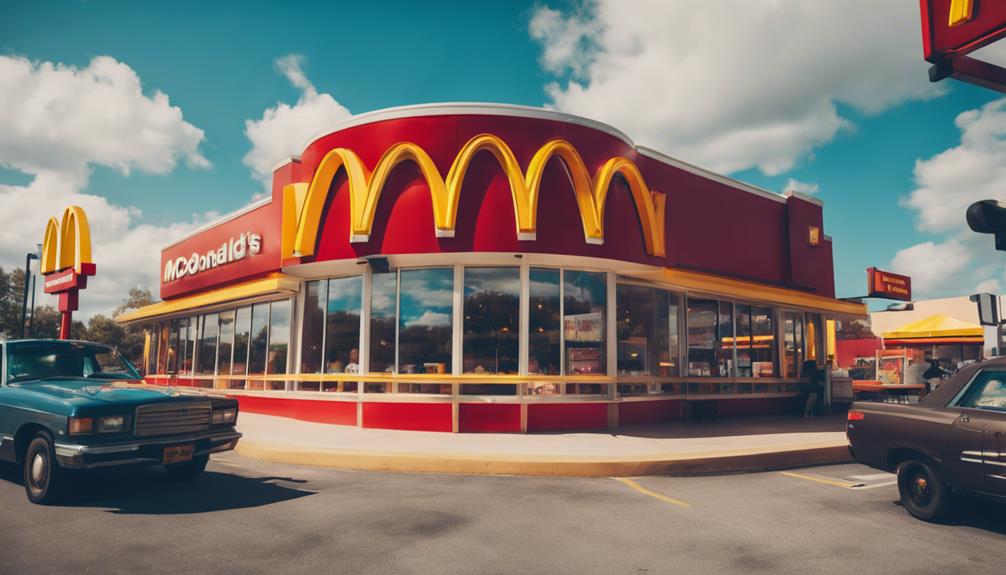
McDonald's brand identity stands out through its impressive global awareness and commitment to sustainability initiatives.
Operating in 119 countries, it showcases a remarkable adaptability that resonates with diverse markets.
This combination of recognition and responsibility solidifies McDonald's position as a leading player in the fast food industry.
Global Brand Awareness Metrics
While many brands endeavor for global recognition, few achieve the level of awareness that resonates with diverse audiences like McDonald's does. Their iconic golden arches are instantly recognizable across the globe, symbolizing fast food and convenience.
According to recent studies, McDonald's ranks among the most valuable brands, with a staggering 96% recognition rate among children. This impressive figure underscores the brand's commitment to marketing strategies that reach various demographics.
Additionally, McDonald's employs targeted advertising and sponsorships with major events, further solidifying its presence worldwide. The company's ability to adapt its menu and services to local tastes also enhances its brand awareness, ensuring that McDonald's remains a familiar and beloved choice for customers everywhere.
Commitment to Sustainability Initiatives
Committed to sustainability, the fast-food giant is increasingly incorporating recyclable materials into its packaging and toy offerings. McDonald's aims to make all packaging from renewable, recycled, or certified sources by 2025. This initiative reflects the brand's recognition of environmental issues and its responsibility towards reducing waste.
Additionally, the company has committed to eliminating plastic toys in favor of more sustainable options, enhancing its eco-friendly image. McDonald's also actively supports sustainable sourcing for its ingredients, ensuring that the food served aligns with environmental best practices.
Through these efforts, the brand not only addresses consumer concerns but also strengthens its identity as a modern, responsible corporation, committed to making a positive impact on the planet.
Global Presence in 119 Countries
Operating in 119 countries, the global presence of McDonald's showcases its ability to adapt and thrive in diverse markets, reinforcing its brand identity as a leading fast-food chain.
Each location tailors its menu to local tastes, introducing items like the McSpicy Paneer in India and the Ebi Burger in Japan. This flexibility not only appeals to regional preferences but also fosters a sense of community connection.
McDonald's strategic partnerships and sponsorships enhance its visibility and integration into various cultures.
With over 38,000 restaurants worldwide, the brand continues to dominate the fast-food industry, proving that it can maintain consistency in service and quality while embracing the uniqueness of each market it enters.
Information for Franchisees
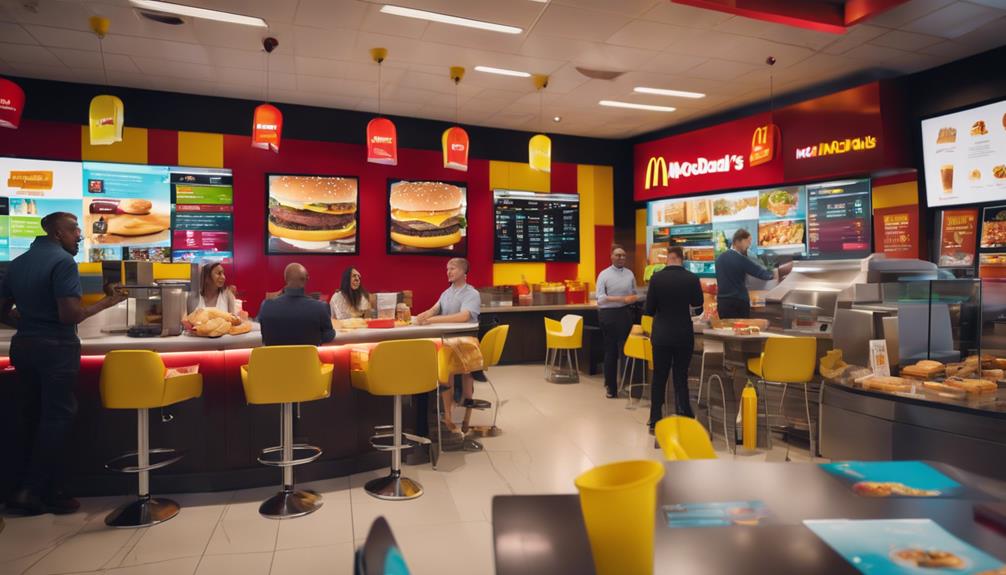
How can prospective franchisees leverage McDonald's extensive support system to guarantee their success in the competitive fast-food market?
McDonald's provides a robust framework that includes thorough training through Hamburger University, ensuring franchisees master operational excellence.
They also offer ongoing marketing support, allowing franchisees to tap into established campaigns.
The brand's well-defined supply chain simplifies inventory management, making it easier for franchisees to maintain quality and consistency.
Additionally, McDonald's shares best practices and operational guidelines, helping franchisees navigate challenges effectively.
With a global presence and a proven business model, franchisees can benefit from the brand's reputation while gaining insights from experienced operators.
This collaborative environment fosters growth and success in the fast-paced food industry.
Financial Requirements & Ongoing Fees
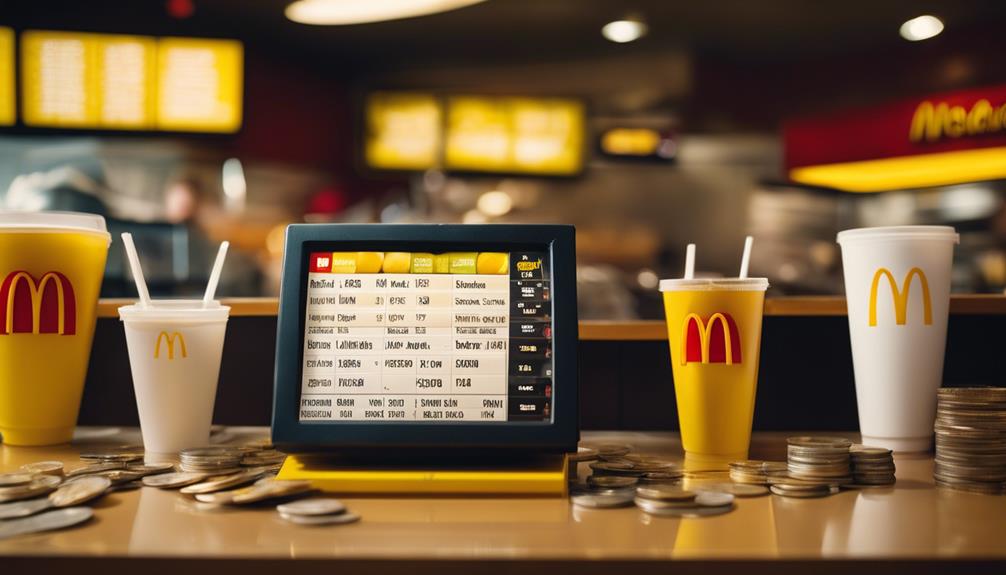
When considering a McDonald's franchise, potential owners need to understand the financial landscape, including startup capital requirements and initial investment costs.
Ongoing fees, such as a percentage of franchise revenue and contributions to marketing, play a vital role in the business model.
Additionally, royalties for product innovations can impact overall profitability, making it essential for franchisees to plan accordingly.
Startup Capital Requirements
Startup capital for a McDonald's franchise typically ranges from $1 million to $2.3 million, covering initial fees, equipment, and real estate costs.
Franchisees must pay an initial franchise fee, which is around $45,000. Additionally, they'll need to secure financing for construction, kitchen equipment, and signage.
Ongoing fees include a monthly service fee of 4% of gross sales and a 5% royalty fee, which supports brand marketing and operational assistance.
Franchisees should also anticipate other expenses like insurance, utilities, and employee wages.
Understanding these financial requirements is essential for potential franchisees, as it sets the foundation for a successful business venture within the McDonald's system.
Initial Investment Requirement
Understanding the initial investment requirement for a McDonald's franchise involves examining both the financial obligations and ongoing fees that franchisees must manage.
The total startup costs typically range from $1 million to $2.3 million, covering expenses like real estate, equipment, and initial inventory. Franchisees also face a franchise fee of about $45,000, which grants them access to the brand's established system and support.
Additionally, franchisees need to allocate funds for construction and décor, which can vary considerably based on location.
Ongoing fees include a monthly service fee of 4% of gross sales and contributions to national and local advertising. These financial commitments guarantee that franchisees uphold the brand's standards while aiming for profitability.
Ongoing Franchise Revenue Percentage
Franchisees must pay an ongoing service fee of 4% of their gross sales, which helps maintain McDonald's brand standards and supports its marketing efforts.
This fee is essential for ensuring consistency across the franchise, enabling McDonald's to uphold its reputation for quality and service.
Additionally, franchisees are responsible for contributing to local advertising, which can vary by region.
While the 4% service fee is a standard requirement, franchisees often find that the benefits, such as brand recognition and support from the corporate team, outweigh these costs.
This structured financial model helps sustain McDonald's position as a leading fast-food chain, allowing franchisees to thrive within a globally recognized brand framework.
Marketing Contribution Percentage
In addition to the ongoing service fee, franchisees contribute to a marketing fund, typically set at 4% of their gross sales, which supports national advertising and brand initiatives.
This contribution is essential for maintaining McDonald's strong brand presence across various media platforms. The marketing fund helps finance campaigns that promote new products, seasonal promotions, and community engagement activities.
By pooling resources, franchisees benefit from a collective advertising effort that increases brand visibility and drives customer traffic. This unified approach not only strengthens the McDonald's brand but also supports individual franchises in attracting customers.
Ultimately, this financial commitment illustrates the franchisees' dedication to the overall success of the McDonald's brand and its continued growth in a competitive market.
Royalties for Product Innovations
McDonald's franchisees pay royalties on product innovations, which include ongoing fees that support the development and marketing of new menu items.
These financial requirements guarantee that franchisees contribute to the brand's innovative edge, allowing McDonald's to stay competitive in the fast-food industry.
The royalties typically represent a percentage of sales, enabling the corporation to fund research and development of new offerings, from specialty burgers to desserts.
Additionally, ongoing fees help promote these innovations through marketing campaigns, guaranteeing that franchisees benefit from increased customer interest.
This system fosters a collaborative environment where franchisees can leverage corporate resources while contributing to the brand's overall success and appeal.
Financing Options
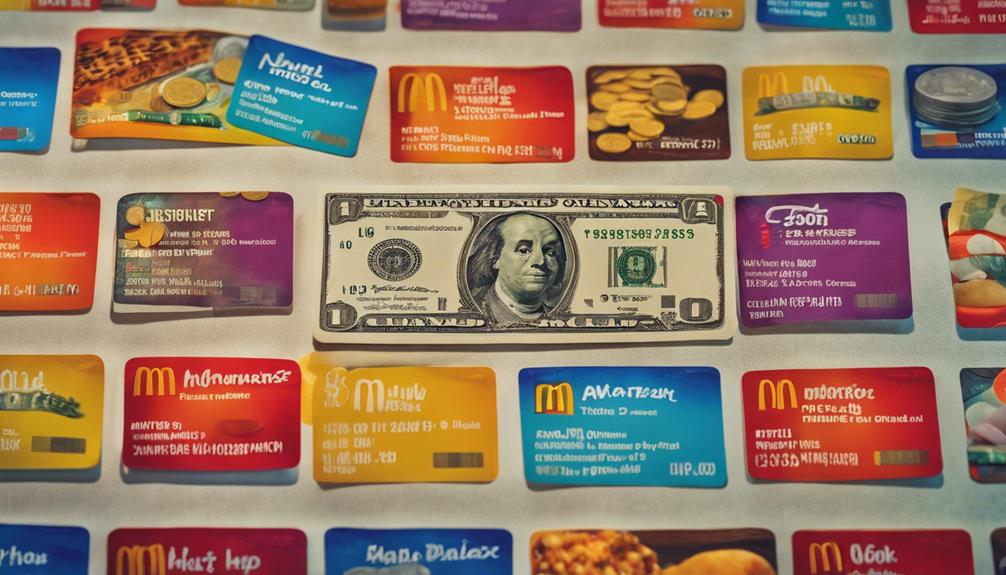
When considering financing options for opening a McDonald's franchise, potential owners have various paths available.
In-house financing options can provide immediate support, while alternative funding sources offer flexibility for different financial situations.
Additionally, government-backed loan providers can help aspiring franchisees secure the necessary capital to start their business.
In-House Financing Options Available
Many franchisees appreciate the in-house financing options offered by McDonald's, which help ease the financial burden of starting a new restaurant. This program allows potential franchisees to secure funding directly from the corporation, streamlining the process and reducing reliance on external loans.
McDonald's provides flexible payment plans tailored to individual needs, making it easier for entrepreneurs to manage their financial commitments. Additionally, the company offers guidance and support throughout the financing process, ensuring franchisees have the necessary resources to succeed.
Alternative Funding Sources Available
Franchisees exploring alternative funding sources can consider options like small business loans, crowdfunding, or partnerships to supplement their financing needs.
Small business loans offer competitive interest rates and flexible terms, making them an attractive choice for many.
Crowdfunding platforms allow franchisees to reach out to a broader audience, garnering support from potential customers and investors who believe in their vision.
Partnerships can also provide valuable resources and shared financial responsibility, reducing individual risk.
Additionally, franchisees might explore community development financial institutions that focus on supporting local businesses.
Government-Backed Loan Providers
Government-backed loan providers offer franchisees a reliable financing option, ensuring access to capital with favorable terms and lower interest rates.
These loans help aspiring McDonald's owners navigate the financial hurdles of starting a franchise. With the backing of government agencies, lenders often impose less stringent credit requirements, making it easier for entrepreneurs to secure funding.
Franchisees can use these funds for various expenses, such as purchasing equipment, renovating locations, or covering initial operating costs.
Additionally, government-backed loans often feature longer repayment periods, allowing franchisees to manage cash flow more effectively.
Training & Support Offered
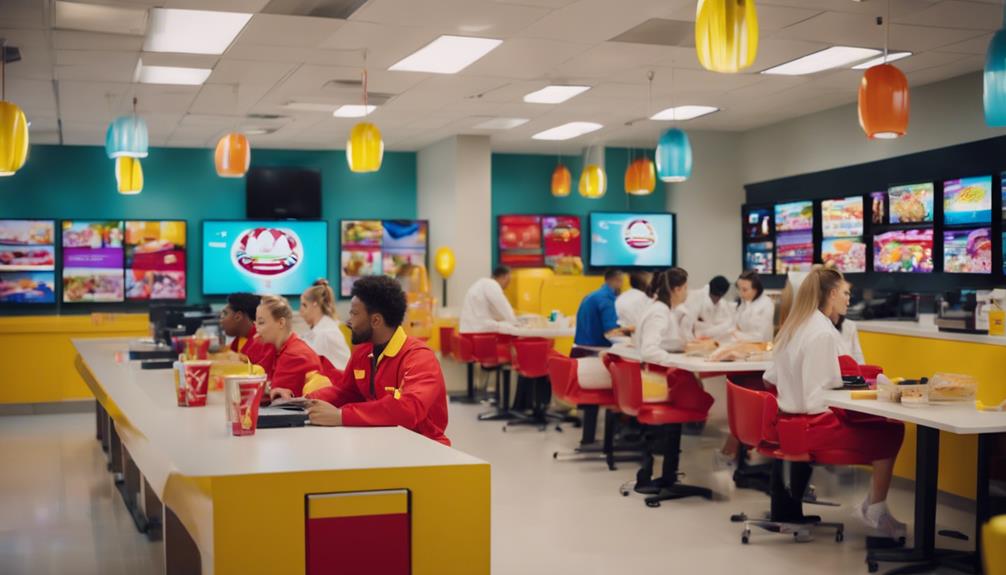
McDonald's prioritizes employee development through thorough onboarding workshops that lay a strong foundation for new hires.
They also offer continuous skill enhancement programs to guarantee staff remain proficient and engaged.
Additionally, operational guidance and marketing tools support employees in delivering the best customer experience possible.
Comprehensive Onboarding Workshops
To guarantee new employees feel welcomed and prepared, extensive onboarding workshops provide essential training and support tailored to McDonald's operational standards. These workshops cover a variety of topics, including customer service, food safety, and teamwork. New hires engage in hands-on activities that mirror real-life scenarios, fostering confidence in their roles.
By emphasizing McDonald's core values and operational procedures, employees gain a clear understanding of expectations. Moreover, the workshops encourage a sense of community among new team members, allowing them to build relationships from the start.
This thorough approach guarantees that every employee feels equipped to succeed, ultimately enhancing customer experiences and maintaining high standards throughout the organization.
Continuous Skill Enhancement Programs
Continuous skill enhancement programs at McDonald's empower employees to improve their abilities and advance their careers through ongoing training and support. These programs offer various resources, including workshops, online courses, and mentorship opportunities designed to foster personal and professional growth. Employees engage in hands-on training, gaining valuable skills in customer service, management, and operational excellence.
With initiatives like Hamburger University, McDonald's emphasizes the importance of continuous learning, ensuring that team members are well-equipped for success. This commitment not only boosts employee confidence but also enhances overall team performance. By investing in their workforce, McDonald's creates a culture of growth and development, ultimately benefiting the company and its customers.
Operational Guidance and Marketing Tools
Employees receive thorough operational guidance and effective marketing tools that enhance their ability to succeed in their roles and drive customer engagement.
McDonald's supports its workforce through Hamburger University, a global training initiative established in 1961, where over 300,000 employees have honed their operational and management skills. This program emphasizes practical knowledge and best practices that guarantee consistency across locations.
Additionally, the company provides employees with marketing resources that help boost sales and customer interaction. By equipping staff with both operational training and marketing tools, McDonald's fosters a culture of continuous improvement.
This dual focus not only empowers employees but also keeps customers satisfied and engaged, ultimately contributing to the brand's enduring success in the fast-food industry.
LEGAL AND REGULATORY
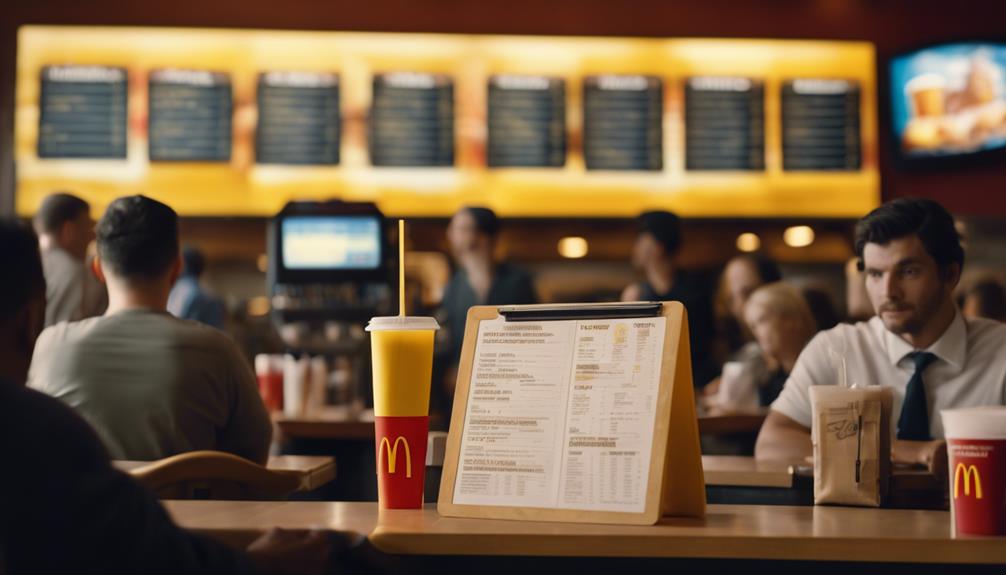
McDonald's guarantees its franchisees adhere to strict legal compliance standards through thorough guidelines.
These regulations cover various aspects of operations, from food safety to employee rights, emphasizing the importance of corporate responsibility.
Franchise Legal Compliance Guide
The Franchise Legal Compliance Guide serves as an essential resource for McDonald's franchisees, outlining their legal obligations and key sections to review.
It guarantees that franchisees operate within the framework of regulations, protecting both the brand and the individual franchise.
Understanding these legal requirements is vital for maintaining compliance and successful business operations.
Key Sections to Review
Franchisees must understand key sections of the legal and regulatory compliance guide to navigate the complexities of operating within the McDonald's system effectively.
This guide outlines essential regulations, including operational standards, marketing practices, and employee rights.
Legal Obligations
Understanding legal obligations is essential for maintaining compliance within the McDonald's franchise system.
Franchisees must adhere to various regulations, including health and safety standards, labor laws, and advertising guidelines.
Regular training and audits guarantee franchisees stay informed about these requirements.
Failing to comply can result in penalties or even the termination of their franchise agreement, emphasizing the importance of legal diligence in the fast-food industry.
MARKET ANALYSIS
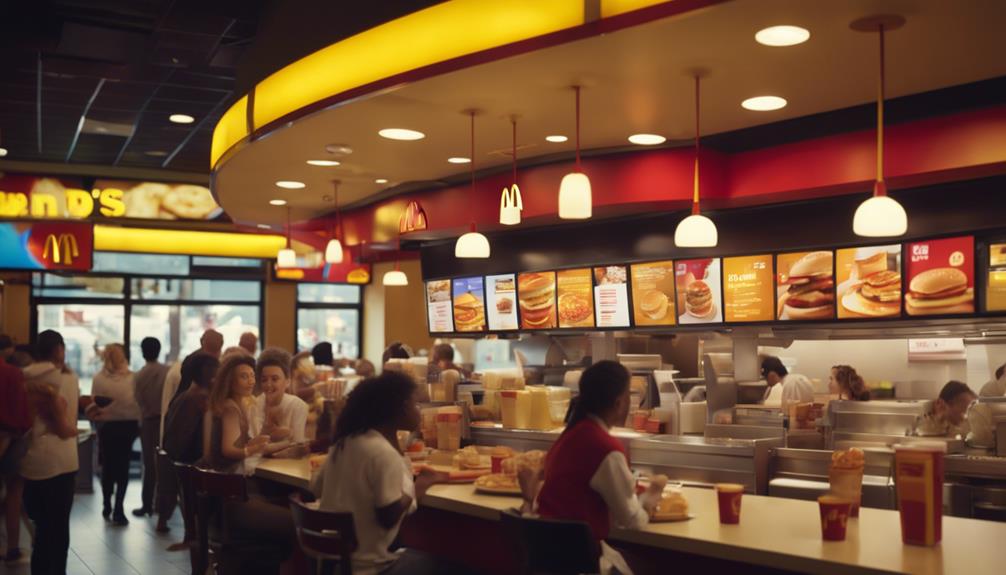
McDonald's is responding to the growing demand for plant-based options by expanding its menu to cater to health-conscious consumers.
Millennials and Gen Z are particularly influential in driving these preferences, as they seek more sustainable and varied dining choices.
This shift not only enhances McDonald's appeal but also positions the brand to stay competitive in an evolving market.
Plant-Based Menu Expansion
McDonald's has recognized the growing demand for plant-based options, leading to a significant expansion of its menu.
Recent trends show an increasing consumer preference for healthier, sustainable food choices, prompting the fast-food giant to adapt accordingly.
As a result, McDonald's isn't only enhancing its offerings but also positioning itself strategically in a competitive market focused on plant-based products.
Plant-Based Menu Growth
The growing demand for plant-based options in fast food reflects a significant shift in consumer preferences, prompting major chains to expand their menu offerings.
McDonald's recognizes this trend and is actively exploring innovative plant-based products.
This strategic move aims to attract health-conscious customers and tap into the lucrative market of environmentally-aware consumers, ensuring McDonald's remains competitive in a rapidly evolving food landscape.
Plant-Based Menu Growth Trends
How are fast food chains adapting to the surging demand for plant-based menu options?
McDonald's is strategically expanding its offerings to include plant-based items, reflecting consumer preferences for healthier choices.
This trend aligns with a broader industry shift, where chains are introducing meat alternatives to attract a diverse clientele.
As a result, plant-based menu growth is becoming essential for staying competitive in the fast food market.
Millennials and Gen Z Preferences
Millennials and Gen Z greatly influence fast food trends, prioritizing convenience and sustainability in their dining choices.
Their preferences often lean towards brands that align with their values, such as healthier options and ethical sourcing.
Understanding these insights can help McDonald's tailor its offerings to better meet the desires of these key demographics.
Millennials' Fast Food Preferences
In recent years, fast food preferences among Millennials and Gen Z have shifted towards healthier options and sustainable practices, reflecting their values and lifestyle choices.
They increasingly favor brands that prioritize organic ingredients, plant-based alternatives, and environmentally friendly packaging.
Additionally, convenience and technology play crucial roles, as mobile ordering and delivery services become essential for attracting these younger consumers to fast food establishments like McDonald's.
Millennials' Dining Habits Insights
Shifting dining habits reveal that Millennials and Gen Z prioritize health-conscious choices and sustainable practices when selecting fast food options.
They favor plant-based alternatives and ethically sourced ingredients, reflecting a growing concern for personal well-being and environmental impact.
Additionally, these generations are drawn to brands that promote transparency and social responsibility, pushing McDonald's to adapt its menu and marketing strategies accordingly.
EXIT STRATEGY
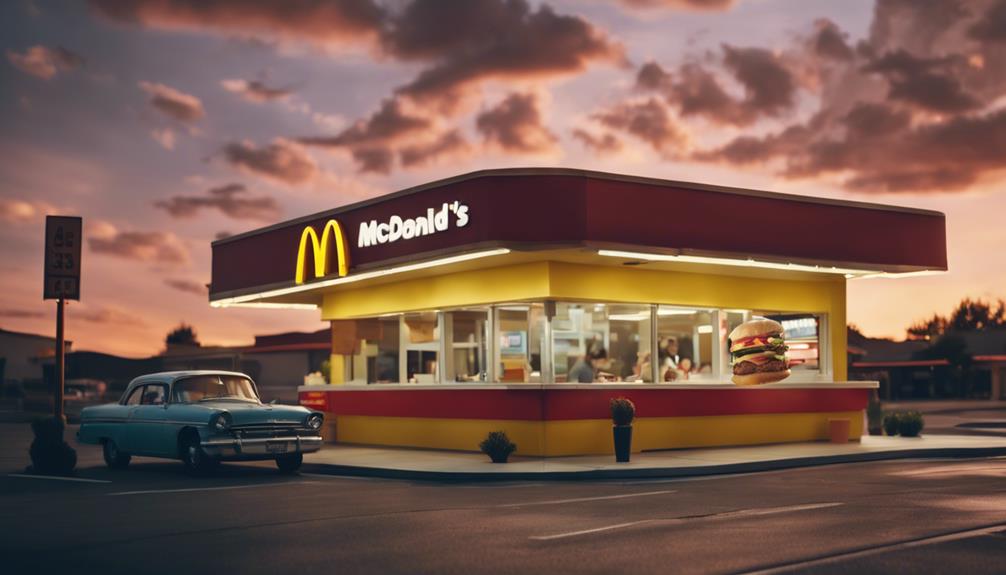
McDonald's implements franchise buyback programs to guarantee smooth changes for franchisees looking to exit. These procedures not only simplify the process for sellers but also maintain brand integrity.
Additionally, the franchise transfer procedures provide a clear pathway for new owners to step in, promoting stability within the system.
Franchise Buyback Programs
Franchise buyback programs offer a strategic exit option for owners looking to divest from their McDonald's locations. These programs provide a streamlined process for franchisees to sell their restaurants back to the corporation, ensuring a smooth shift while maintaining brand integrity.
This initiative not only supports franchisees in their exit but also allows McDonald's to manage its locations effectively. By buying back franchises, McDonald's can implement operational improvements and expand its strategic goals.
The buyback option often appeals to owners seeking to retire or pursue different ventures, enabling them to realize their investments without the complexities of finding a buyer.
Franchise Transfer Procedures Explained
When a franchise owner decides to exit the business, the transfer procedures guarantee a seamless shift to new ownership while preserving the brand's integrity. McDonald's has established clear guidelines for this process, ensuring potential buyers meet specific criteria.
First, the existing owner must notify McDonald's of their intent to sell, and the company will assist in evaluating prospective buyers.
Next, the buyer undergoes an approval process that includes financial assessments and operational readiness. Once approved, the franchise agreement is updated, and the new owner receives extensive training.
This structured approach not only protects the franchisee's investment but also maintains McDonald's standards, ensuring that customers continue to enjoy consistent quality and service.
ADDITIONAL RESOURCES
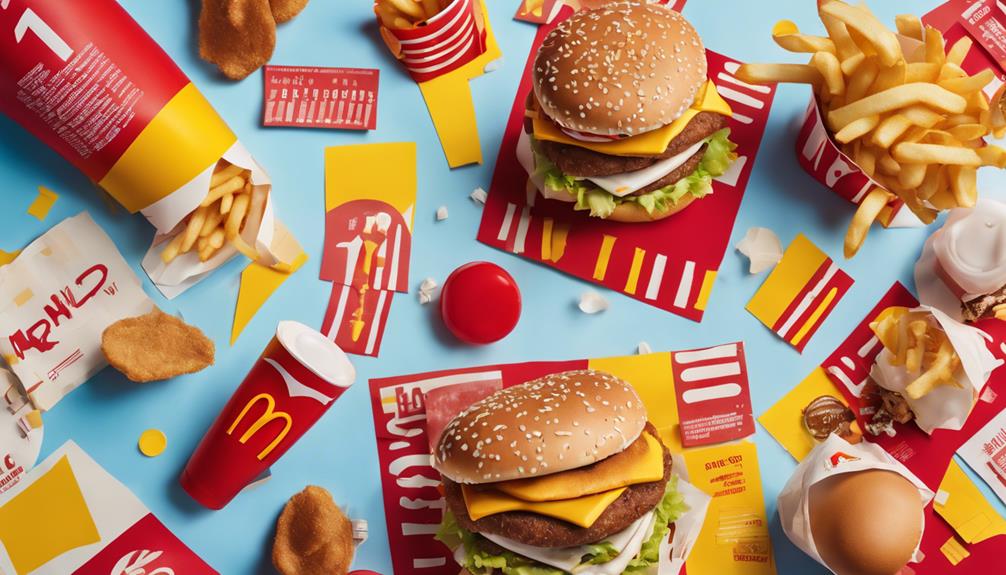
In exploring the additional resources available to McDonald's franchisees, one finds essential support systems designed to enhance their success.
These resources include direct contact details for franchise support and opportunities for networking with fellow franchisees.
Together, they foster a collaborative environment that strengthens the franchise community.
Franchisee Support and Resources
Providing thorough support, McDonald's equips its franchisees with a range of resources to guarantee operational success and brand consistency.
This includes extensive training programs, marketing materials, and ongoing operational support. Franchisees gain access to a wealth of knowledge through Hamburger University, where they learn best practices and management skills.
Additionally, McDonald's offers digital tools to streamline operations and enhance customer engagement. Regular updates on menu innovations and promotional strategies guarantee that franchisees stay competitive in their markets.
With a dedicated support team, franchisees can address challenges promptly, fostering a collaborative environment.
Franchise Support Contact Details
McDonald's franchisees can access dedicated support contact details to guarantee they receive timely assistance and resources for operational success. This system guarantees that franchisees can reach out to specialized teams for guidance on various operational issues, from marketing strategies to inventory management.
Each franchisee is provided with a thorough contact list that includes phone numbers, email addresses, and office hours for different departments. These resources are designed to help them navigate challenges effectively and make informed decisions.
Additionally, franchisees can find support through online portals, where they can access FAQs, training materials, and other essential documents. This robust support network underscores McDonald's commitment to empowering its franchisees for sustained growth and success in a competitive market.
Franchisee Networking Opportunities
Franchisees can engage in valuable networking opportunities that foster collaboration and share innovative practices across the McDonald's community. These connections allow franchise owners to exchange experiences and solutions, ultimately enhancing their operational efficiency.
Regular conferences and regional meetings provide platforms for franchisees to discuss challenges and successes, while online forums and social media groups enable continuous engagement.
Additionally, McDonald's organizes training sessions and workshops that not only educate but also encourage networking among participants.
Conclusion
To sum up, McDonald's isn't just a fast-food giant; it's a cultural phenomenon rich with surprising stories and facts. It has been a part of countless people’s lives and has left an indelible mark on popular culture. From its iconic golden arches to its famous Big Mac sandwich, McDonald’s has become synonymous with American fast food. But dig a little deeper and you’ll discover the deli’s unique menu that offers international flavors and local specialties, making it a truly worldwide phenomenon.
From its innovative marketing strategies to its unique menu items that adapt to local tastes, the brand continues to captivate consumers worldwide.
The intriguing tales of celebrity connections and record-breaking moments further highlight McDonald's significant influence on popular culture.
As it evolves, McDonald's remains a demonstration of adaptability and creativity in the ever-changing landscape of the food industry.
